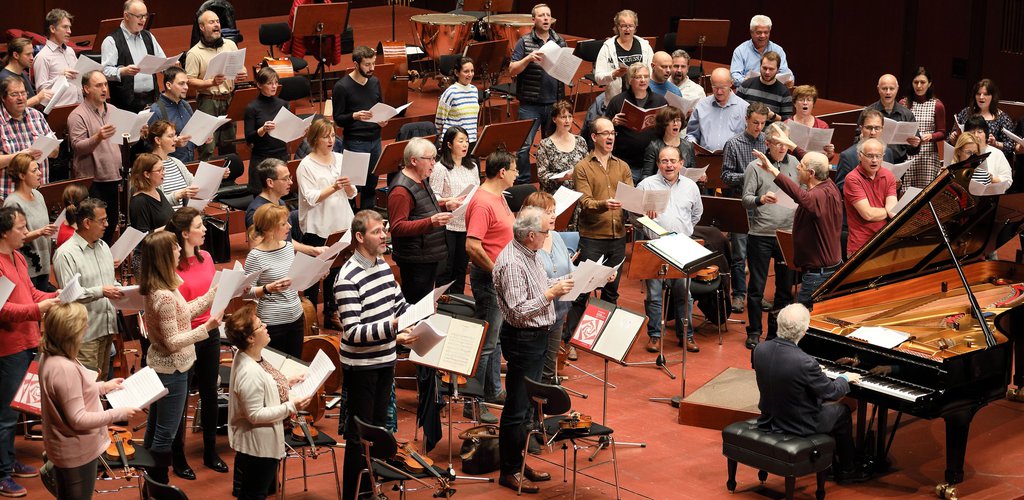The Budapest Festival Orchestra, along with Iván Fischer, András Schiff and beautiful melodies. Bernhard Uske’s review following the BFO’s concert in Frankfurt.
After The Flying Classroom and The Singing Christmas Tree, we now have the singing symphony orchestra. For the second time, the musicians of the Budapest Festival Orchestra, led by Iván Fischer, treated audiences to a performance showcasing their talents as both musicians and singers at their Sunday night concert at Frankfurt’s Alte Oper. The guest performance by the Hungarian musicians kicked off with Antonín Dvořák’s The Forsaken One chorus for mixed choir (op. 29), which the musicians performed scattered around the stage, standing, not seated.
While the vocal cords of the Festival Orchestra may not be quite as refined as the notes they coax from their instruments, their legatos, the diversity of their harmonies and their homogeneity were splendidly pleasing for the eyes and ears alike. And because the choir was not squeezed against the back wall, huddled as a mass beneath the organ, the audience was free to admire the visuals of the shapes and costumes filling the entirety of the stage. Up next was Dvořák’s Legends in C sharp minor (op. 59/6), which was followed by his Slavonic Dance no. 5, making the observer feel as though they had happened upon an encore performance.
This impression came to an end, however, with Ludwig van Beethoven’s Piano Concerto No. 1, and not only because of its grandiose sounds, perhaps inspired by composers of the French Revolution Étienne-Nicolas Méhul and François-Joseph Gossec: András Schiff’s performance was exemplary, bringing together the variety of notes into a content-rich unity. Steadfastly calm, Schiff’s fingers masterfully bring to life the diversity of the melodic arc, leaving no trace of the ordinary distinctions between the main melody, the variations and other linking musical elements. His performance of the piece was simultaneously loose and taut, providing a nearly palpable depiction.
Take, for instance, the rustic character of the second movement, evocative of a village waltz, almost heavy and umpapa-like; despite all its rusticity, it still incorporated a clearly dramatic power of expression, and islands of Beethoven’s willful stubbornness arose in the sea of indignation harboured by the French masses. In the encore, gathering around the piano, the musicians from Budapest once again burst out in song, with the soloist and the choir performing Joseph Haydn’s choral piece The Old Man.
The first line of the piece – “Gone is all my strength” (Hin ist alle meine Kraft) – was an allusion not to the musicians, but to the musical industry, prone to rigidity, where even the decision to perform another of Dvořák’s symphonies, not No. 8 or No. 9, is considered an egregious occurrence. The entire performance made it seem as though the musicians had been freed from their chains, while the audience had acquired something beautiful yet unknown – and this description is applicable to a large portion of the limitless sources of music literature. Those seeking new impressions need not resort to mediocre contemporary pieces.

